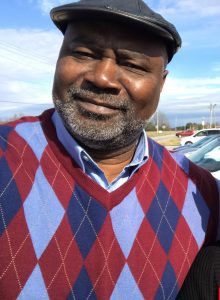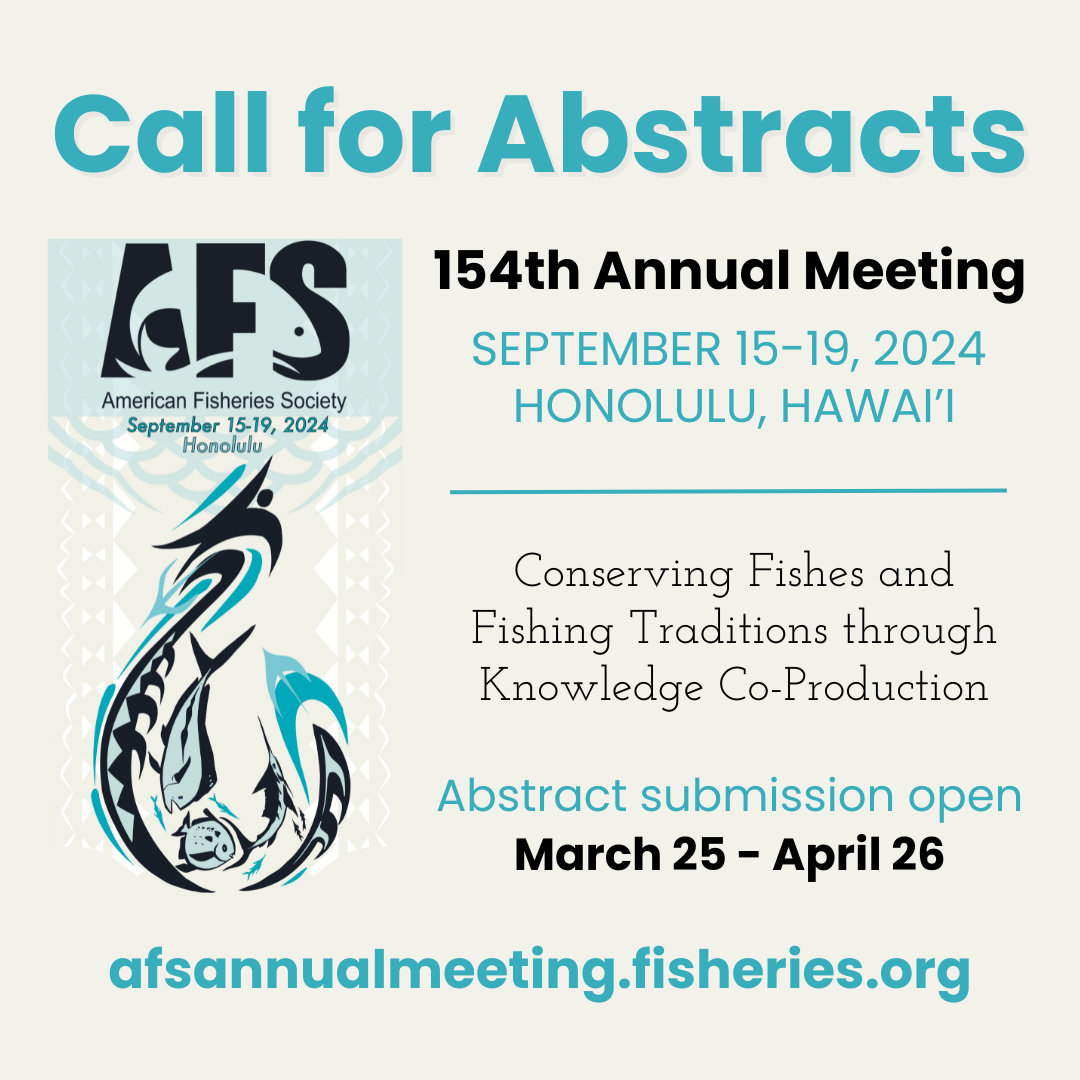Reminder: Voting opens the week of April 20 – current AFS members will receive voting instructions by email. View Cecil’s official candidate statement and register for our live, online Meet the Candidates webinar on April 21.
 What do you see as the role for AFS in the upcoming election given our varied backgrounds and needs to ensure AFS independence and scientific credibility?
What do you see as the role for AFS in the upcoming election given our varied backgrounds and needs to ensure AFS independence and scientific credibility?
Some wise person long ago posited that politics and religion make poor topics for dinner conversations. Our current political climate is highly charged, with opposing side mostly talking past each – listening only to respond with a counter point, instead of listening to understand and evaluate the legitimacy of the other’s point of view. In my opinion, our Society would be most effective in the upcoming election by advocating legislatively for fisheries and aquatic resources for which we have stewardship responsibility without regard to the political parties vying for the office. For example, the American Fisheries Society has written policy statements advocating for positions favorable to fish conservation and sustainable fisheries. These policy statements (e.g., managing at-risk marine stocks, management of invasive species, and stopping or reversing climate change) are then used to educate our nation’s legislators about the ecological and economic consequences of the legislations they enact and help them make informed decisions regarding wise natural resource stewardship. Such policy statements may be most effective by succinctly matching the information about a particular resource or issue with the congressional delegations whose constituents would benefit most from “fish/fisheries friendly” legislation. Partnering with other natural resources organizations and societies with similar viewpoints and objectives would strengthen the message to all those seeking political office. Such a plan should be effective in avoiding political “third rails” while informing those seeking office and their constituency without regard to party affiliation. Such an approach will enable AFS to maintains its objectivity and avoid being labeled as partisan.
How can AFS be more effective in conveying the fisheries impacts of climate change given our limitations such as resources, staff, volunteer time, etc.?
The science on climate change and its effect on fisheries are unequivocal, yet much of the public is unaware of these relationships and the demonstrated or anticipated negative effects on ecosystem function and society. The existence of the information is not the problem, as a quick search on google scholar on the topic of “climate change impacts on fisheries” will demonstrate a growing body of recent literature on the subject. Many of these studies are based on empirical observations, and many are modeling exercises designed to predict how habitats and the fisheries they support will change under varying warming scenarios. In just about all instances, a warming climate has already negatively affected or is forecasted to negatively affect valuable fisheries resources. Unfortunately, most of the general public and their legislative representatives don’t read this literature and are unware or only vaguely aware of the challenges climate change presents. Clearly, we scientists are very effective in communicating our science and its implications to each other, but far less effective in sharing the information with the public and policy makers. AFS can be more effective in conveying the effects of climate change on fisheries by communicating the science at a level and with media used by the typical citizen. Perhaps regular “cliff notes” versions of the existing and emerging science shared via social media (e.g., Face Book, YouTube) would reach a larger lay audience, who could then understand the issues. An informed electorate could then encourage their elected representatives to enact legislation to combat climate change and mitigate or reverse its effects of fisheries.
AFS is involved multiple international partnerships which can address clear needs but also could incur substantial costs in time and funding. –What role do you see AFS playing in international fisheries issues?
To some, the name “American Fisheries Society” may belie the Society’s status as an international organization that has worked effectively with sister organizations in other countries to address pressing fisheries issues facing the partners. Such work is especially challenging as international issues and partnerships working to solving them are complicated by different political systems and cultural practices and priorities. As such, the AFS’s primary role in international partnership should be to be a good collaborator that contributes as needed given its resources and priorities. Being a good collaborator means accepting that one’s role in a partnership may vary (e.g., team leader to team member) depending on the issues and circumstances and embracing that role as needed. In some instances, AFS will be the leader in identifying critical issues, identifying information needs and management alternatives, and advocating vigorously to the appropriate policymakers to achieve the desired outcomes. In other instances, AFS’s role may be to support another international partner (e.g., The Japanese Society of Fisheries Science, The Fisheries Society of the British Isles) as appropriate. In my view, AFS has been an effective international collaborator because it has embraced its various roles (i.e., team leader or team member) as appropriate by engaging in regular and thorough commitment with all partners and developing deep knowledge about the issues and the significance of those issues to each partner. AFS should continue to a good international collaborator to the extent its resources allow.
What do you see as the role of AFS in providing professional continuing education?
The phrase “…developing fisheries professionals” is an integral part of AFS’s mission statement and the Society has played a leading role in providing its members (and others) with opportunities to refresh old skills (e.g., age and growth determination) and acquire new ones as the science (eDNA) and technology (e.g., use of apps and motion activated cameras for collecting creel data) progresses. Much of these training opportunities are provided via continuing education courses taught by AFS members and offered at all levels of the society. I envision AFS’s role in professional continuing fisheries education is to remain among the principal sources of such training for fisheries professionals much as it has been in the past. However, I also envision AFS as a pioneer in employing new delivery platforms (e.g., distance learning, webinars) for its continuing education offerings. Of course, none of this will help AFS achieve its mission of “developing fisheries professionals” if they are unaware of the continuing education offerings the society solicits and hosts at its state, regional, and national meetings. Accordingly, advertising the availability of these opportunities will be important for reaching the largest possible audience. AFS’s service in this role should help it achieve its’s goal of providing continuing educational opportunities that advance the skill sets and efficacy of fisheries professionals.
How does a professional society such as AFS stay relevant in an age of increasingly changing communications options, societal needs and challenges of not fully reflecting the diversity of the nation?
Remaining relevant under the scenarios outlined above is challenging, but quite attainable with a bit of thought and foresight. Each of the situations outlined above presents unique challenges and opportunities. However, the first step in resolving any issue, adapting to societal changes, or remaining current with new technologies and business practices is acknowledging that those things are happening. The second step is being proactive in assessing the implications of the changes to one’s ability to fulfill one’s core mission. The results of that assessment will determine the next series of actions, as appropriate. In my view, AFS is and will remain relevant because it has acknowledged that it needs and wants to be. For example, it has adopted many of the new communication platforms (e.g., Facebook, Twitter) as a means of communicating its science and instituted programs (e.g., Hutton Program) to recruit and retain a diverse corps of fisheries professionals. Certainly, challenges remain and new ones arise constantly – but AFS has a proven track record of being adaptable in completing its core mission under changing technological and societal circumstances. Given this history, I am confident that it will continue doing so.
What is one role that AFS does not currently fulfill that you believe could be important in the future, and why?
This is great question! And it’s one that doesn’t have a simple answer. Societal shifts in opinions and demographics as well as technological advances are happening rapidly, and the challenges facing the environment in general and fisheries in particular are varied and complex. There isn’t a “one thing” that would effectively address all of those challenges equally well. AFS has a very rich portfolio of programs and business practices aimed at fulfilling its mission of “advancing fisheries science and developing fisheries professionals.” A quick visit to the Society’s website will provides ample evidence of the breadth and depth of activities towards those ends. AFS has thrived for as long as it has by recognizing societal and technological changes, being proactive in anticipating the need for adjustments to its programs and business model because of those changes, and being nimble in implementing those adjustments. The Society recently completed its latest 5-year (2020-2024) strategic plan, which includes its vision of challenges and opportunities in that timeframe. My guidance would be to continue being vigilant in assessing the Society’s performance relative to its objectives, being proactive in anticipating the need for adjustments in its programs and business model, and being nimble in implementing those changes. I guess the answer to the original question is sort of simple after all. AFS should continue wanting to improve, continue to assess its effectiveness, and continue to make changes as necessary to fulfill its core mission!


 What do you see as the role for AFS in the upcoming election given our varied backgrounds and needs to ensure AFS independence and scientific credibility?
What do you see as the role for AFS in the upcoming election given our varied backgrounds and needs to ensure AFS independence and scientific credibility?


